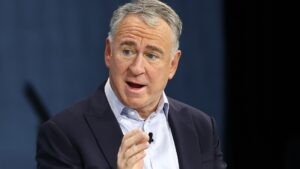The Economic Implications of Trade Wars: Insights from Ken Griffin
In today’s fast-paced financial landscape, having a reliable source of information is crucial for making informed investment decisions. At Extreme Investor Network, we aim to provide you with unique insights and analyses that you won’t find anywhere else. Today, we dive deep into the recent statements made by Ken Griffin, the founder and CEO of Citadel, regarding the impact of escalating trade tensions and tariffs imposed during Donald Trump’s presidency.
Ken Griffin’s Candid Warning
At the UBS Financial Services Conference in Key Biscayne, Florida, Ken Griffin voiced his concerns about the repercussions of President Trump’s aggressive trade policies. Griffin, a notable figure in the hedge fund industry, described these tactics as detrimental not just to the United States’ standing on the global stage but also to the long-term planning for multinational companies. He stated, "From my vantage point, the bombastic rhetoric, the damage has already been done."
Tariffs and Their Ripple Effects
The recent imposition of a 25% tariff on steel and aluminum imports, alongside a previously enacted 10% duty on Chinese goods, highlights a growing trend in U.S. trade policy. For people involved in global finance and investment, such measures raise serious questions about the future of international commerce. Griffin emphasizes the challenge these tariffs pose to long-term capital investments, particularly for multinational firms. He pointed out that the uncertainty surrounding trade terms makes it exceedingly difficult for businesses to plan their strategies for the coming decades.
A Commentary on Crony Capitalism
Griffin also touched on the concept of crony capitalism, which he fears could emerge as a consequence of these punitive tariffs. In essence, crony capitalism occurs when business leaders sidestep fair competition for preferential treatment from government officials. This can lead to a market skewed in favor of those with connections, undermining the principles of free trade that many investors value.
At Extreme Investor Network, we believe that understanding these dynamics is essential for investors looking to navigate today’s uncertain economic environment. The intertwining of government policy and business interests can create risks that are not always readily apparent.
Investing in Uncertain Times
So, what does this mean for you, the investor? Griffin’s insights underscore the importance of developing a diversified investment strategy that accounts for geopolitical risks. Here are a few actionable steps you can take:
-
Diversification: Look beyond traditional equities and bonds. Consider commodities as a hedge against inflation and geopolitical conflict.
-
Stay Informed: Regularly monitor economic indicators and trade agreements. Knowledge is your best tool to adapt your investment portfolio.
-
Risk Assessment: Understand your risk tolerance in light of potential policy changes. Tariffs can quickly escalate, affecting various sectors differently.
- Global Perspective: Don’t limit your investments to domestic markets. Explore opportunities in foreign markets that may offer stability amid fluctuating U.S. trade policies.
At Extreme Investor Network, we are committed to providing insights that empower our readers to make informed and strategic investment decisions. As the global economic landscape continues to shift, staying ahead of the curve has never been more critical.
Conclusion
Ken Griffin’s warnings serve as a crucial reminder of the intricate web connecting government policies and successful investing. In an era where trade wars can shape the market landscape almost overnight, being proactive is your best defense. For more exclusive insights and expert analysis, stay tuned to our blog, where we strive to equip you with the knowledge needed to thrive in the ever-evolving world of finance.
Don’t miss out on future updates that can impact your portfolio—join the Extreme Investor Network community today!

